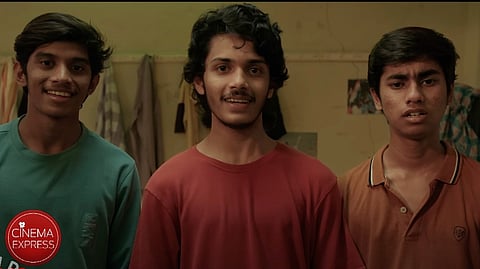

AIR All India Rankers, the latest web series on ETV Win, centres around the struggles of three IIT aspirants who enroll into a fancy college to prepare for their IIT goals. One of them is Arjun (Harsh Roshan) who joins the institute under a different set of hopes and tries to opt out the moment he realises his mistake. At the reception desk, he tries to dissuade another young boy who is accompanied by his father. When the receptionist tries to cajole the father figure, he says. “I never listened to my own son, why will I listen to a random boy?” It’s a hilarious off-hand moment, but also works because of how slyly it offers a comment on something deeper about parental pressure and the impressionable phase of adolescence — something AIR struggles to do in its entirety.
Director: Joseph Clinton
Cast: Harsh Roshan, Bhanu Prakash, Jayatheertha, Chaitanya Rao, Sunil, Sandeep Raaj
Streaming on: ETV Win
For the first few episodes, AIR has a lot of fun with its premise and protagonists. There are many little visual details that add to the humour (I loved the canteen wall with an anti food-wasting quote, while students are creating ruckus in the foreground). It’s also admirable that the makers attempt to touch upon the omnipresent caste dynamics that always finds a footing even at closed-off educational premises (a scene that has now been deleted after strong criticism from certain section of audience). The series is well-produced throughout, be it the lively camerawork (SS Manoj) or the music. Sinjith Yerramilli provides a catchy background score that captures the volatility of the atmosphere at a young and competitive atmosphere like the institute. However, what lacks depth is the writing itself.
Debutant writer-director Joseph Clinton forgets to build on the core tenets of his premise; i.e. the pressure young aspirants undergo at competitive exam institutes, or the rank-based sections where a student feels the constant need to be ‘promoted’ in order to feel worthy. It’s not a well-rounded universe in AIR, where you also get a glimpse of the toppers and the dark horses. This show has a very limited landscape, where it chooses to purely focus on the three boys, instead preferring to lend screentime to a subplot about an admin officer and his secret crush which adds nothing to the proceedings. The series spends too much on the fun and frolicking, and less screenspace on the actual conflict.
One is not saying that AIR needed to be more intense than it is. But even under a layer of humour, Joseph Clinton needed to be more incisive in his commentary. Unfortunately, besides a blanket statement about competitive atmosphere for students, there’s nothing much the series seems to be saying. During one of the handful of introspective conversations of the series, a character says, “the real victims are the parents,” which bizarrely feels unearned and out of context, almost shifting the focus off its very theme. At some point, the show introduces an earnest teacher figure Surya (Chaitanya Rao Madadi), a noble soul amidst a sea of indifferent opportunists. However, Surya remains woefeully underwritten and incidental for the longest time — before the makers decide to go fully preachy in the last episode. (Chaitanya Rao brings his best despite a half-baked role)
The show never builds on the stakes with each passing chapter. After the universe is set up, the second act of AIR, comprising of three episodes which are all a version of each other, is centred around the three boys and their many defiant antics at the institute. After a point, Arjun, Imran and Raju cease to have separate personalities — their collective adolescent spirit is what drives the show. Even though each of them comes from a distinct background, there are no individual drives or barriers for them anymore — which is ironic because that’s exactly what made the first two episodes so enjoyable. There is not enough exploration of the friendship among the three, either — Arjun, Imran, and Raju remain united in their penchant for rebellion without a cause, but what else binds them? We can’t really say.
This lack of psychological exploration eventually catches up with the show as the writers focus on a single unpardonable act by the three boys for conflict point, instead of capturing their gradual decay of interest in the system. A 240-minute series boils down to a single misfire by our protagonists, and how they redeem themselves after it — these narrative choices are a grave disservice to the idea of long-form storytelling. It doesn’t help that the show is set in early 2010s, a pre-smartphone era, where things were different and probably far less emotionally complex for a young student trying to navigate the many pressures of their life, not to mention a different scenario in terms of commercialisation of education, and the repurcussions.
Who is the target audience for AIR then? Probably teenage boys who want something comforting to watch in the background, something that feels familiar but not too emotionally intense to compel you to pause or reflect. However, AIR once again draws attention the gaping scope for improvement for Telugu filmmakers when it comes to making insightful long-form content about simple subjects.